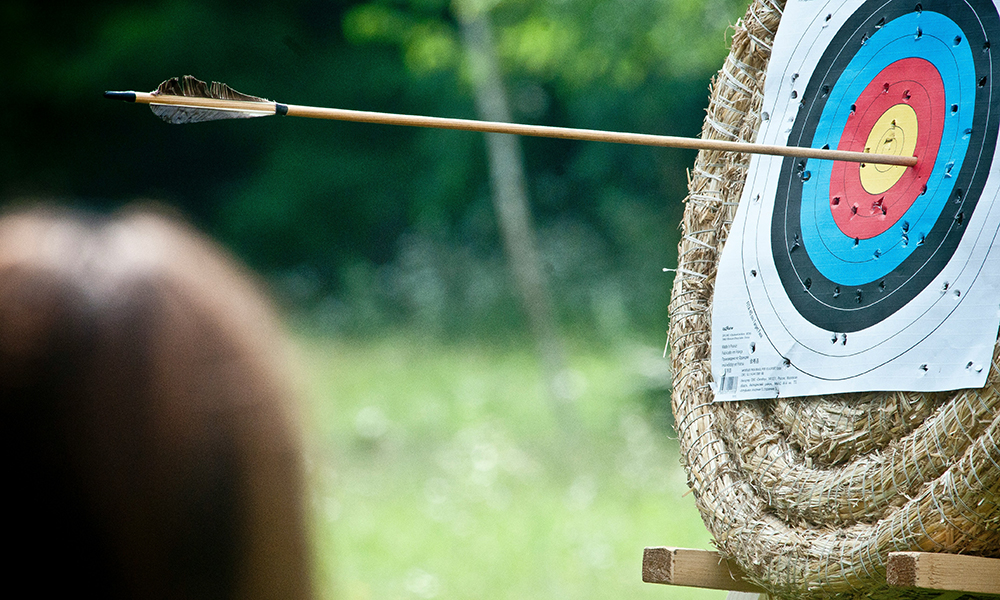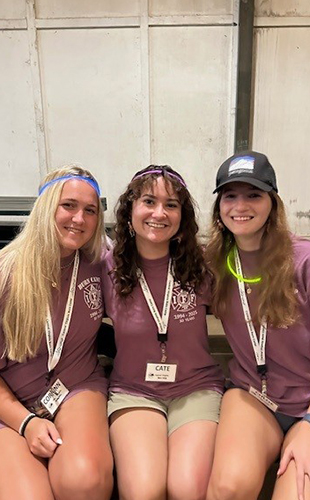OT student develops assistive device for Central Virginia Burn Camp
College of Health and Behavioral Studies
Corrinn Ford, a second-year student in the Occupational Therapy program, was connected with the Central Virginia Burn Camp (CVBC) two summers ago. CVBC aims to provide a safe, fun and rewarding overnight summer camp experience for young burn survivors.
Julie Bonham, Program Director of the JMU Occupational Therapy program, serves as the Co-Director of CVBC. She helped arrange for Ford to volunteer at the camp as field work experience.
“The camp is a very typical summer camp,” explained Ford. “There are activity days with stations, we have our three meals a day together, and we have an opening and closing campfire.” The group also takes field trips related to the summer’s theme; this year, campers went to the Smithsonian museums in Washington, D.C.
In addition to the traditional summer camp activities, campers spend part of their time working in small groups with psychologists and occupational therapists to discuss their experience as burn survivors. Psychosocial practice is embedded into the entire camp experience. In addition to working with professionals, the majority of counselors are pediatric burn survivors and attended CVBC as children.
“I think it’s very therapeutic for the kids to be able to identify with people who are going through the same struggles they are,” said Ford.

A very popular activity for campers at CVBC is archery, though some campers face limitations in their participation due to the nature of their injuries.
“Every kid is different,” said Ford. “Limitations could look different for different kids based on the severity of their burn or the timeline of how long it’s been since their injury, but we do our best to make sure everyone is included and can participate in as many activities as they want to.”
Ford took that inclusion mindset the extra mile this past year. In her Assistive Technology class, Ford and a group of her peers worked together to develop a device to support campers at CVBC in archery.
The class, Ford explained, began with considering how different populations and age demographics may have different needs in regard to assistive devices. Local agencies with connections to the Occupational Therapy program, including CVBC and Woodrow Wilson Rehabilitation Center, collaborated with the classes’ groups to assign projects.
For her project, Ford and her group “found the best option was to create something called a mouth tab,” she explained. “A lot of Paralympic athletes use something similar.”
The mouth tab device is a small piece of a rubber capsule with a loop of paracord a few inches in length. “You wrap the cord around the string of the bow and the rubber piece, put the rubber piece on a back molar, pull the string and release,” she explained.
“The point of the device was to allow kids who are possibly missing appendages or limbs to be able to participate in archery,” said Ford. Ford described archery as a highly sought-after and competitive activity for many campers at CVBC. “We wanted to provide an option for kids who wanted to try archery but that may not have been possible for them with the technology and equipment we had.”
Ford said the mouth tab device is not only safe and cost-effective, but would cover a wide variety of abilities, allowing a large number of individuals to use the device as an option. Additionally, the device can be sanitized and used by multiple campers.
This past summer, Ford brought the device to camp for campers to try out during archery. “It was fun for those who tried it,” said Ford. “I think they really appreciated that we wanted to offer it as an option for them.”
Ford said it was “amazing” to see campers using the device she developed. She shared that the head of archery at CVBC looks forward to promoting it as an option to campers in future years as well.
Ford explained that while the device might not be something every camper wants to use, providing choices that allow campers to participate in ways that provide agency in choice and comfort for the campers was important for her, allowing them to use their voice to decide what they want to use to help them be successful at archery.
“I’m just happy to have been able to do this for the camp,” said Ford. “It meant a lot to me, and those kids mean a lot to me.”
Ford is in her level two field work this semester, working in a pediatric clinic and an acute care hospital for adults. She looks forward to graduating, taking her boards and starting work in OT in the near future, along with continuing to volunteer at CVBC in the years to come.
“Corrinn embodies JMU’s call to Be the Change, demonstrating intellect, compassion, and meaningful action through her service with the Central Virginia Burn Camp,” said Bonham. “She approaches this work with both passion and humility, recognizing the privilege of supporting an extraordinary community of children and counselors whose resilience and strength are truly inspiring.”
